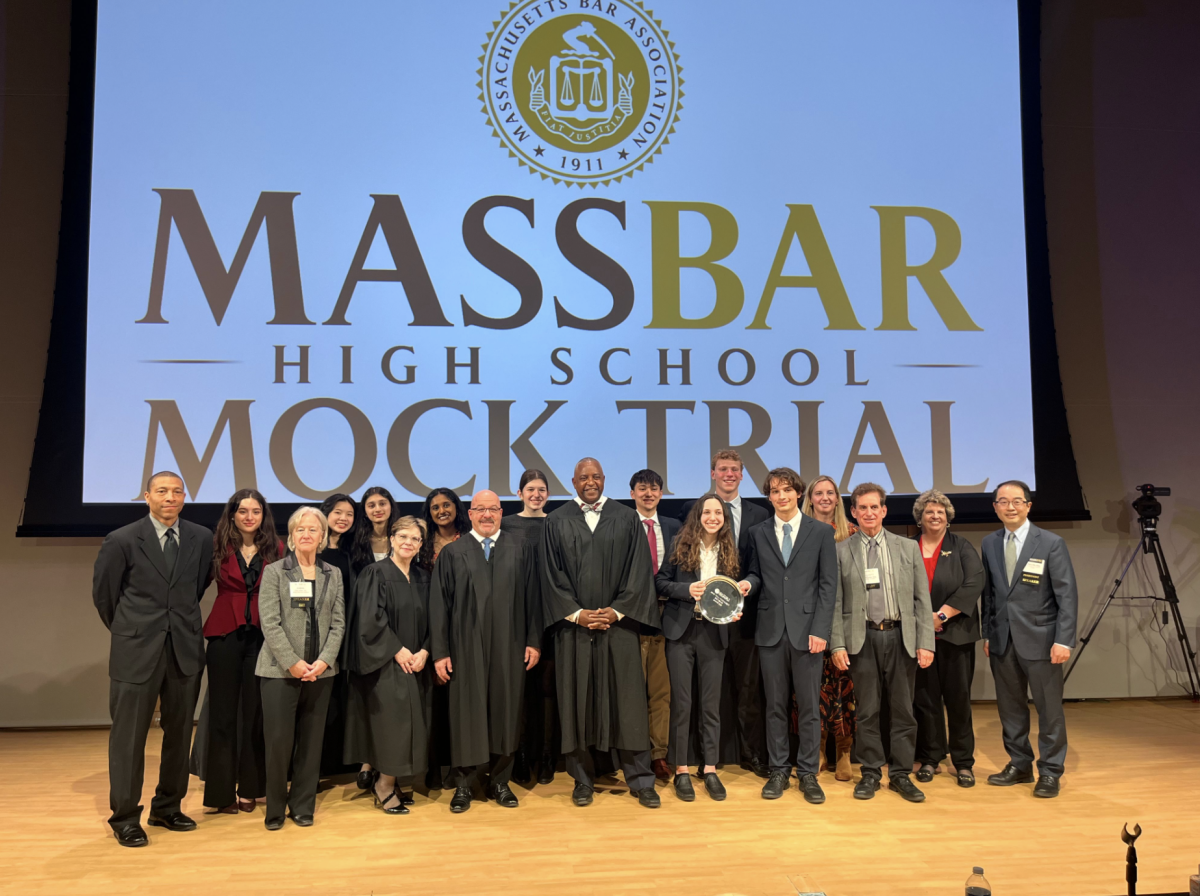
Nobles’ Mock Trial Club was started to share a love of law. Biannually, the club hosts an intramural season dubbed “Spring/Fall Intrateams,” open for all students at Nobles to sign up. Students are assigned a team and argue different sides of a case. The “trial” occurs in a classroom on the upper level of the Academic Center, where desks constitute the witness stand, the bench, and the attorneys’ tables. For the past decade, the year has been sliced into thirds: Fall Intrateams, Spring Intrateams, and a small window would be left open in the middle for the three State Tournament trials the Club participated in. The Massachusetts Bar Association (MassBar for short) hosts a yearly high school tournament, in which a team must win all three consecutive trials to qualify. Nobles Mock Trial had never made it past Trial #3, losing the second trial in 2022, and missing the third trial by one point in 2023.
Unlike many other Mock Trial Clubs in the area, Nobles Mock Trial is also entirely student-run, with student-led weekly meetings, student-authored and peer-reviewed trial documents, and student-sought advice from History and Social Science Faculty Beth Reilly and Oris Bryant, both legally trained. On the other hand, many other schools employ the guidance of practicing lawyers or go so far as to designate an official position as “Mock Trial Coach” for the team. Additionally, sandwiched between the Intrateam trials, Nobles’ prep for the MassBar Tournament begins in late December, whereas some teams will begin building their cases weeks earlier. Finally, though it certainly has a learning curve, worries over just how much of a commitment the Mock Trial Club requires resulted in an administrative push to swap out some students from the 2024–2025 roster for certain trials. So why, just like in the movie, were we so successful?
The 2024–2025 season brought with it an incredible turnaround for Mock Trial’s record in the tournament. Whereas the team had never before qualified, this season saw it speed past the qualifiers, regionals, semi-finals, and make it to the States Championship Round. There was the indispensable aid and support from Reilly and Bryant, and each student on the team devoted themselves to their case. Under the leadership of Aydin Alsan and Val Lane (both Class I), all participants revised and memorized their arguments past the demands any other club would have made. Sophomores, juniors, and seniors collaborated and met during and after school, recited objections, and practiced rebuttals. The team members became closer, and the change was noticeable. “The environment this year was really supportive, and we collaborated every step of the way,” Bella Kong (Class II) said. Luck certainly played a part in the Club’s success; some trials were so close that another judge could reasonably have found for the other side.
“The environment this year was really supportive, and we collaborated every step of the way.”
The case MassBar presented this year was one about drunk driving, though it’s important to note that case files presented in MassBar are completely fictitious. At a graduation party, Devon Roy, the father of Kai Roy, provided non-alcoholic and alcoholic beverages to guests, which were separated with the assumption that kids would stick to the non-alcoholic drinks. Payton Bolles and Alex Parker, both students in the case, drank alcoholic beverages and were involved in a car crash while driving home from the party. Parker is suing Roy for negligently providing alcohol to minors, which he argues caused the crash. The Plaintiff (Parker) needs to show that Roy’s alcohol was accessible to the students, and that it was inebriation as a result of the alcohol that caused the accident. The defense needs to break the chain of causation. In other words, the defense must either say that Roy’s alcohol wasn’t accessible or that the alcohol wasn’t what led to the crash. Every Mock Trial team prepares to argue both sides.
For the Finals, Nobles took the stance of the Plaintiff. The round was close, with Nobles losing by less than a five-point margin to the Winsor School. In the basement of the Boston Public Library, lawyers and judges spectated and presided over the trial. Lauren Peloquin (Class I), delivered an “expert testimony” in the role of a toxicologist. Alex Yoon, Class II, resisted the urge to call the witness “it” (because teams are unaware of the person playing a given witness’s gender until the trial, a mix-up of their pronouns is common). The year ended with a celebratory dinner, and the Club prepares for the next season and beyond. “Even though it wasn’t the outcome that we wanted, [Finals] was still a great experience, really fun, and we learned a lot from it. I hope that next year’s leadership can get us back to regionals and to States,” Val Lane (Class I) said. No pressure.
Despite its success, Nobles Mock Trial has never been about winning trials. It’s a congregation of students who want to go to law school, saw an episode or two of Suits, or just thought it’d be fun to try. Some stay for the MassBar Tournament, and others stay for another Intrateam season. Some retire after a trial. Nobody, however, goes into Mock Trial alone. Commitment, collaboration, and camaraderie should be credited for this year’s coup.
